DCAU Review: "Second Chance" (1994)
Hefner's Note: All screencaps are either by me or have been taken from Worlds Finest Online's review and Two-Face bio page, as well as the seriously lackluster review up at ToonZone. Sadly, there are virtually no gifs from this episode floating around online, which is really disappointing. Between the lack of gifs and the superficial reviews, I can't help but feel like the episode I'm about to discuss with you today is one of the more under-appreciated ones from all of B:TAS. But you'll have to be the judge of that when all's said and done.
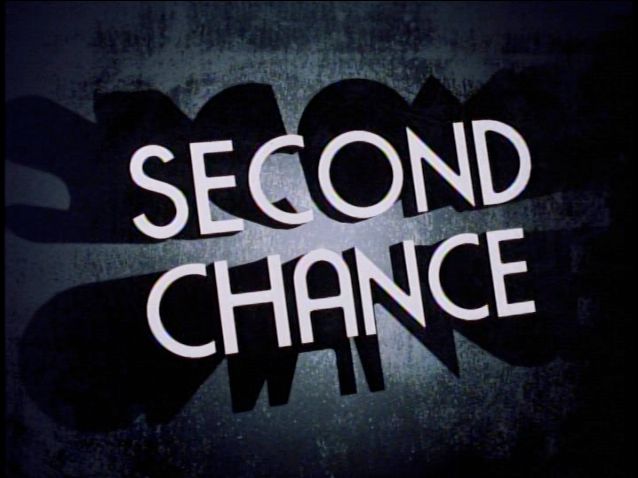
The third season episode Second Chance (which you can watch here) is, for all intents and purposes, the first true sequel to Harvey's origin two-parter. While Two-Face became a recurring villain throughout the series, this episode was the first since Harvey's fall, rebirth, and meltdown to specifically focus on the fractured psyche of Harvey Dent, expanding upon the few details that we already knew. Here, we finally get a good glimpse at what's going on inside the mind of Two-Face, and the findings may be worse than we'd feared.

But these elements are all secondary (hurr) to what the episode is really about, which is an exploration of friendship under pressure as examined not just between Bruce and Harvey, but also Batman and Robin. As I've noted in the past, writers have sort of unofficially given Harvey a strange status amongst the Robins, none of whom have ever quite seen eye to eye with Batman when it comes to his unyielding faith in Harvey Dent. Second Chance puts a different spin on that dynamic by setting it in a universe where Harvey was Bruce's best (only?) friend from way before Robin came along, thus creating the friendship equivalent of love-triangle between the three (or four?) protagonists.
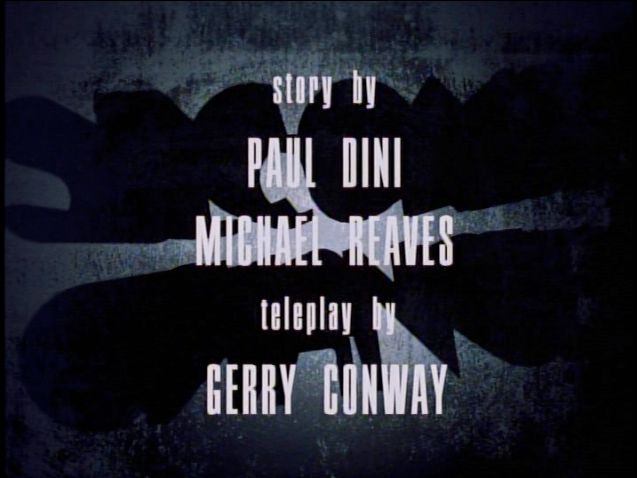
All of this is told through a classic-style detective mystery plotted by the Pretty Poison team of Michael Reaves and Paul Dini, whose story contains loose elements of Doug Moench and Klaus Janson's Knightfall-era story Double Cross, both parts of which I've reviewed here and here. The actual teleplay is written by Gerry Conway, the comics stalwart who brought back Rupert Thorne and Hugo Strange and co-created Killer Croc and Jason Todd, a veteran who also has experience with writing Two-Face!
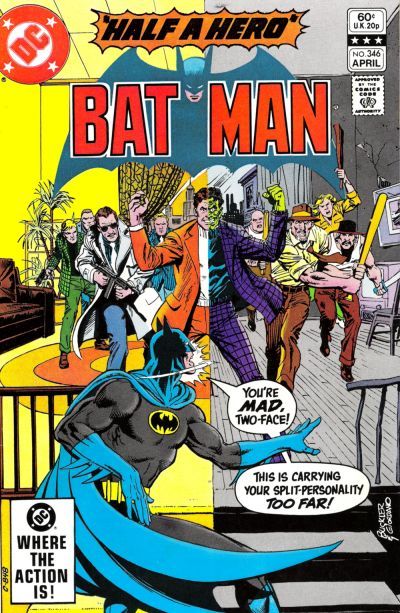
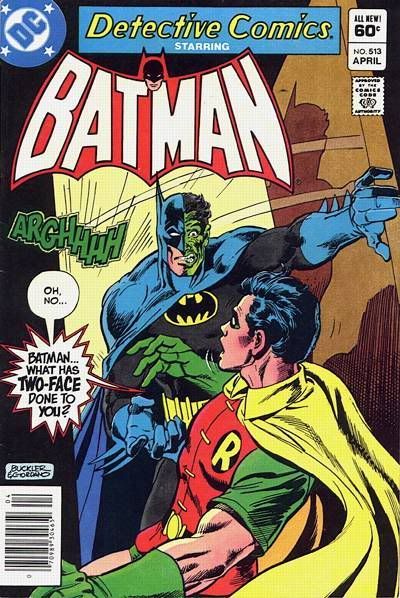
I have mixed feelings about Conway's story because--fun as it was--it disregarded Harvey's previous appearance where he seemed to be on the verge of redemption and reconciliation with Gilda. That was a great, moving story with a potentially happy ending, but a couple years later, Conway brought Harvey back with no mention of Gilda, and he even threw in a blond love henchgirl love interest to boot! Was Harvey's return (and subsequent disregard of the character's own events) Conway's own idea, or was it mandated by editorial who just wanted to have everyone's favorite scarred number-themed villain back with an unchanged status quo? Heck if I know!
What matters is that Conway has experience not just with writing Batman and Robin, but also with making life suck even worse for poor Harvey Dent. A noble tradition, that! Combined with a plotting team whose previous take on Harvey had him as an oblivious romantic fool who spent most of the episode in a coma, these three writers unite to tell the second best Two-Face episode of B:TAS, and one of the key stories when it comes to the conflicts that Harvey represents. Both of them.
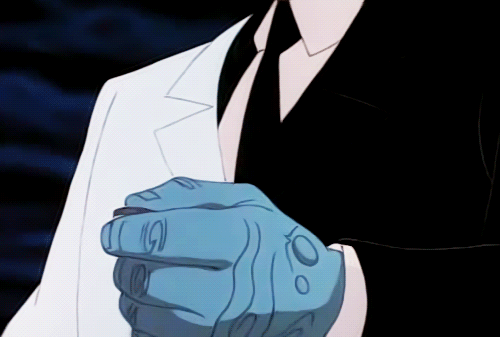
Gif by tokomon. Sadly, this is the only gif from the episode that I've been able to find.
Second Chance opens with a title card that seems blander than normal, but I suppose that there's something to be said about how those words cast long, dark shadows. In fact, the title disappears entirely once the writing credits are listed, but those shadows still remain. Perhaps that was intentional. Even still, I find it odd that the music which plays over this ominous card is rather dream-like and melancholy, without even the barest hint of Harvey's trademark leitmotif.

The title card fades into a scene of dark clouds in the verge of a thunderstorm, a theme that ran throughout Harvey's origin episode to signify two key moments when his dark side broke through. One again, this monster-movie-standard is used to punctuate the reveal of Two-Face, who shows up here in chains as he's escorted to a little late-night plastic surgery session as Batman and Robin watch and wait on the rooftop.

This gives way to a brief retelling of Harvey's scarring which, at first glance, seems to be just reused footage from the end of Two-Face: Part I, when in fact they reanimated and revoiced the whole thing beat for beat, just from a few different angles! While I appreciate the fact that they didn't go the route of cheap recycling, I feel like this was a missed opportunity to add in a detail or two that could have fleshed out some pertinent and still-lacking bits of backstory. As it is, we'll have to settle for the few brief glimpses of insight we're about to get in this upcoming scene, as we return to the surgery in present day.
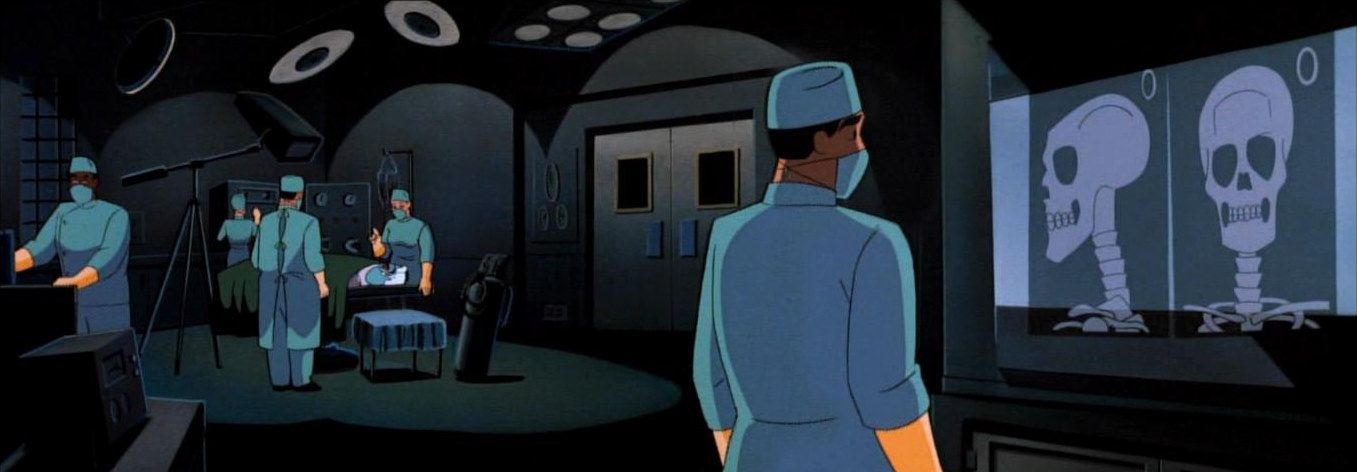
Present in the operating room is none other than Harvey's therapist, Dr. Nora Crest, here making her first and only other appearance in B:TAS since Two-Face: Part I. She's not exactly recognizable as the same character thanks to the mask and scrubs, but she's definitely credited as Dr. Crest, and she's also voiced by the same actress, Linda Gary (who, it seems, passed away less than a month after Second Chance had aired! RIP). While it's nice to see that she hasn't given up on Harvey, what's a therapist even doing in the OR? Well, I guess she's just there to oversee the procedure as moral support for her patient, not to mention deliver handy exposition for us, the audience.
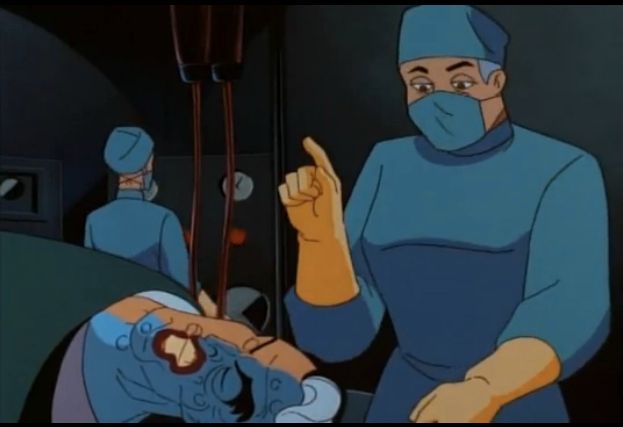
DR. CREST: Your bad side is almost completely submerged. You've done very well in therapy, Harvey. You're more in control now, able to make decisions for yourself without relying on chance. Now it's time for the final step: erasing the scars that created Two-Face. I believe that once you are whole again, your mind will be strong enough to banish Two-Face permanently.
So yeah, the premise sounds rather similar to what Dr. Wolper and Dr. Willing tried to do with Harvey in Frank Miller's The Dark Knight Returns, and we all know how well THAT worked out. While it's definitely huge news that Harvey is now able to decide without his coin, that could just result in him becoming entirely consumed by his darker side. Worse, Crest seems to be pushing for suppression, and while I don't know about how Harvey's mental illness would or should be treated in real life, that sounds like an incredibly bad idea in a literary context. What Harvey seems to desperately require in reintegration.
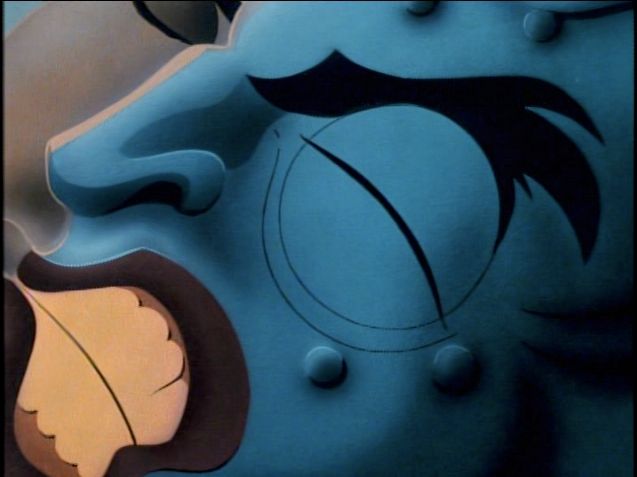
Because really, would Harvey ever be truly strong enough to "banish Two-Face permanently?" As far as we know, Big Bad Harv was always there under the surface, brought out by stress. Even if Harvey is "strong enough," it will be a lifelong battle to keep that side submerged and in check, much like an alcoholic has to constantly keep vigilance over something which will never, ever go away. But for the sake of this story, let's accept Dr. Crest's theory for the time being. Under the circumstances, and especially depending on how this treatment forces the villain into action, we have no reason to believe that this plastic surgery wouldn't have been just the thing to give Harvey the edge he would have needed to overcome his dark side.
In fact, this episode shows the only other glimpse we ever get into the best part of Harvey Dent that still exists within Two-Face. Just before he succumbs to the anesthesia, Harvey has a moment to speak his mind, although while his voice is softer than the usual Two-Face snarl, it's still harsher than his normal voice before the scarring. It just seems like further evidence that his vocal cords were permanently damaged... if not in the explosion, then in the primal scream of his that followed.
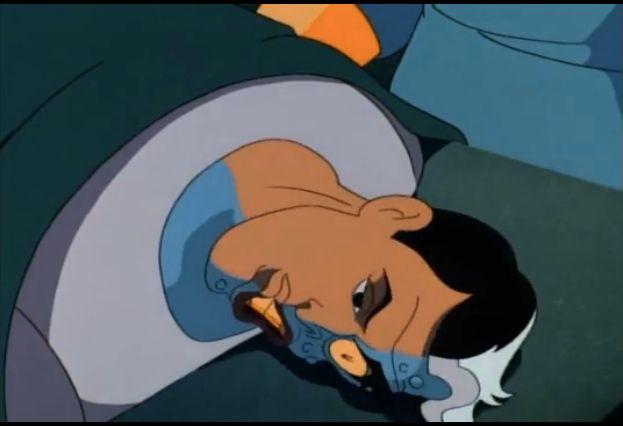
His first spoken line is to ask Dr. Crest, "Bruce Wayne put up the tab for this?" and he asks it with such incredulity, as if no one would go to such lengths for him, much less his own best friend.
HARVEY: Good old Bruce. He's never given up on me. Always been my best friend. I remember when we used to close the town at the Half Moon Club. Most fun we ever had. Heard they were tearing the old place down. I guess... nothing good lasts forever...

Apparently, while Harvey's "evil" eye still has lids (unlike most Two-Faces), he can't close them all the way. Maybe that's symbolism about how the bad side never sleeps? Or maybe I'm just wanky and reaching? YOU DECIDE.
Putting aside the foreshadowing plot-point-ness of that "Half-Moon Club" line, it's here that we get our a rare glimpse into the friendship that was between Bruce and Harvey. It gives me visuals of them being a kind of two-man rat pack of the Gotham City society pages, and Harvey's recollections are made all the more poignant when one considers that Bruce's carefree playboy persona is generally just a front. I have to wonder how much of Harvey's nostalgia for the "good old days" was genuine on Bruce's part? For anyone else, the answer would be "none of it, everything Bruce does is a carefully-cultivated façade, a-DUH" but I'm not so sure in this case. If Bruce's upcoming actions in this episode are any indication, Harvey may have been the only person that Bruce was even semi-comfortable being Bruce Wayne around.
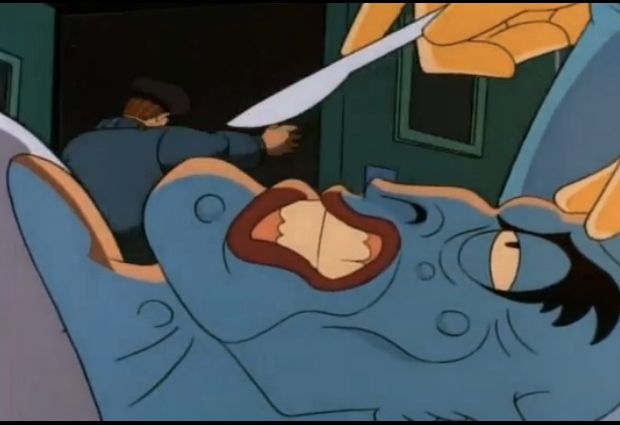
Naturally, the procedure is interrupted at the last second by a gang of hoods who shoot up the joint, succeed in beating Batman and Robin, and end up kidnapping the unconscious Harvey Dent. "Don't hurt him," the lead goon commands, "Boss wants to handle Dent personally. Said he wants to teach him some respect."
This is also, to the best of my knowledge, the first confirmation that TAS Harvey's scarring covers the entire half of his body, even though it was just his face the last time we saw a post-explosion Harvey Dent in a hospital gown. As I've said in the past, I've always been annoyed by full-body scarring on Two-Face because it's just such overkill, but at least it makes sense considering the uniquely explosive origins of TAS Two-Face. Therefore, seeing as how I am clearly the final authority in all such matters, I shall ~graciously~ allow it in this one instance!
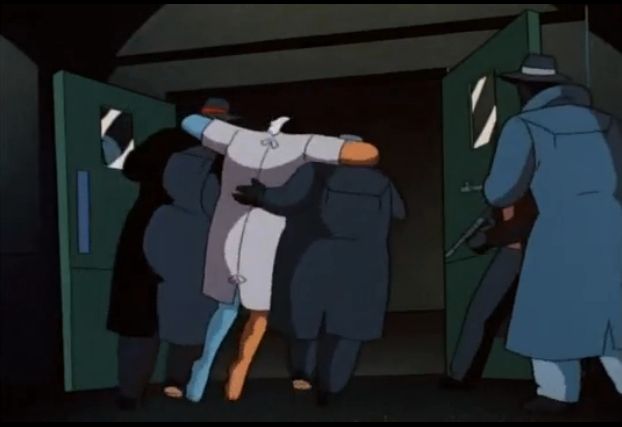
After a quick shot to establish that Dr. Crest and all of the surgeons are A-OK, we're treated to an extended car chase sequence as Batman and Robin chase down the getaway car, only to discover that Harvey's not inside! There was a second car! Really, this should have tipped them off right away, but eh, gotta go through the motions. Besides, this could all be chalked up to the possibility that Batman has a blind spot when it comes to Harvey Dent, one kept in place by a combination of hope and denial that's very rare for Bruce. As a result, this episode seems to want to have Bruce take his frustrations out on the person closest to him--his ward and sidekick--but the resulting dialogue just kind of makes Dick Grayson look like a petulant child.
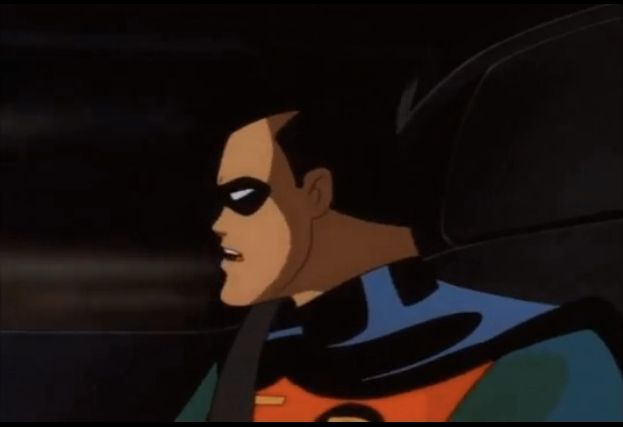
ROBIN: Sorry I wasn't able to stop them.
BATMAN: I'm sure you did your best.
ROBIN: Don't gush all over me, it's embarrassing.
BATMAN: Sorry. Harvey's my friend, and I'm worried about him.
ROBIN: Right, and I'm just a kid in tights.
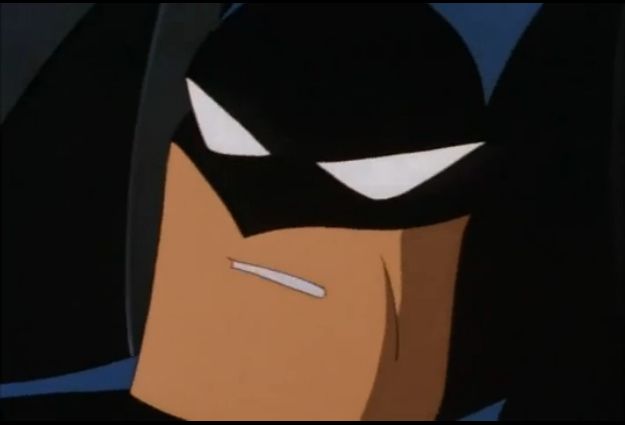
I think I may have hurt myself from rolling my eyes so hard. Oh my god, shut up, Dick. I know that this episode wants to show that just because Bruce lost one friend, he needs to remember that he still has one in Dick, someone who will be there for him just as loyally as Bruce will be for Harvey. But considering that Bruce does nothing to treat Dick like less than a friend, Dick's complaint comes across as butthurt, self-absorbed jealousy. Yeah, don't, like, have any sympathy for the pain Bruce is going through or anything, Dick. And really, "I'm sure you did your best" isn't good enough? Dude, Batman just apologized! BATMAN! Geez, what more does Dick want?!
Still, I do feel a small amount of sympathy for what Dick must be going through here, especially when you take into account the awkward role that all Robins are in when it comes to being the third wheel between Batman and Two-Face's ongoing drama, with Bruce desperately trying to save the soul of this man who is constantly trying to kill him, not to mention his sidekick too. The idea of someone trying to save someone from themselves is something which exists in the real, non-superheroic world that you and I presumably inhabit.
You can find these parallels in the form of someone struggling with addiction, mental illness, or even just something deeply flawed in a person's nature, and often times the only way they can hope to overcome these demons is to have the love and support of friends the hopeful highs and crushing lows. Unfortunately, the harder the struggle, the more it can weigh down on those friends until it threatens to drag them down too, to the point that it can strain that friend's other relationships as well! To a third party involved, this can be deeply frustrating. The temptation is to say, "Let them fall! They're not worth it!" which often comes with an undertone of "Why do you even need that person? You have me, a friend who won't drag you down, who won't hurt you, and I'm here for you now!"
That's the position I see the Robins in, as they have to watch their father figure tear himself up with constant misery and disappointment over a person who--in their eyes--just plain isn't worth it. It doesn't help that Two-Face has also tried to kill Dick himself on more than one occasion, and if you take Robin: Year One-era Dick into account, then yeah, he has plenty of reason to hate Harvey himself. But B:TAS!Dick here doesn't have that excuse, yet he still exhibits a similar frustrations towards Bruce coupled with a lack of empathy (thanks to a lack of personal connection) for Harvey. So yeah, I do sympathize with Dick a bit here... even if I still think he's being a petulant, butthurt child.

Way to go, Dick. Batman is now sad.
So, Batman and Robin split up to investigate two likely suspects, both of whom have good reason to want to ruin Harvey's life, although only one of them has that established by canon: Rupert Thorne. If I'm not mistaken, the last time we saw Thorne was when he was trussed up like a Christmas turkey in the first five minutes of Shadow of the Bat: Part I. Thorne was finally brought to justice in that episode, and while it wasn't apparent at the time, Harvey was instrumental in the arrest so as to both exact revenge as well as usurp Thorne's place as underworld kingpin. And yet, in this episode, Thorne's back as if nothing had ever changed.

I just assumed that this was because much of B:TAS followed the status-quo-reset-button nature of superhero comics where the villains who were arrested in one episode would suddenly be back on the streets in the next one with no explanation whatsoever, so continuity in this show only matters if the writers want it to matter. Still, I can't help but see this as rubbing salt in the wound for Harvey, that for all his work as both D.A. and mob boss, his worst enemy is still sitting pretty, continuing to get away with everything.
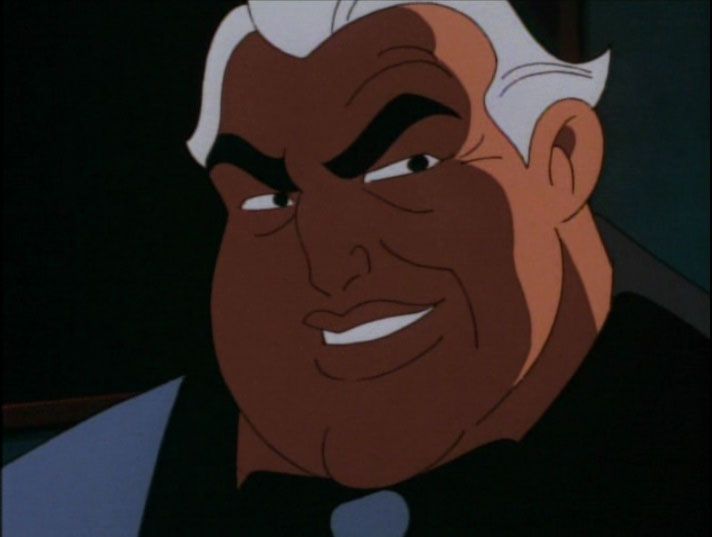
Well, I guess this can be accepted given the fact that Harvey already had some measure of revenge once, not to mention the fact that this episode explicitly points out who Two-Face really hates more than anyone else, and Thorne doesn't even warrant a mention. I guess Harvey's beyond that now... for some reason. Besides, if you really wanted to find a reason why Thorne might be free, Harvey himself might be to blame for that, seeing as how he chose to bring Thorne down using Gil Mason in a web of lies and corruption. I'm sure Harvey's meddling created enough technicalities to get Thorne off. That failure could be all the more reason why the villain of this episode hates Harvey Dent so intensely, simply because his bungling allowed a Grade-A menace like Rupert Thorne go free.
Hey, if this show's not going to give me canon, then goddammit, I'm just gonna take what there is and come up with something myself!
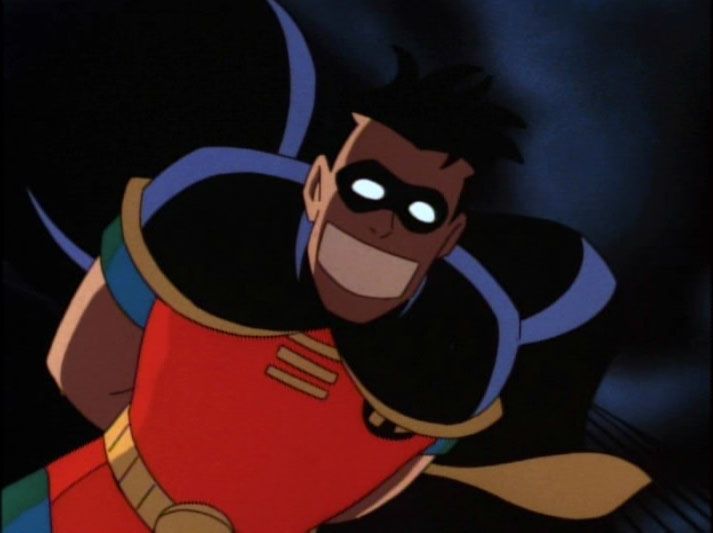
After Thorne denies his involvement in the kidnapping to Robin, he decides, "Well, this evening shouldn't be a total wash. I'll have the sidekick killed!" and orders his men (including Frankie, the thug who kicked mud on Harvey way back in Two-Face: Part I) to throw Dick off a bridge. This gives way to a nice little moment where Frankie gets to wax philosophical like a Tarantino crook, which helps give a teeny bit of personality to the otherwise bland henchman. His monologue also serves as a nice set-up for Dick to deliver the punchline... with his feet. It's a nicely-executed scene, and for once, Robin's snarky quip didn't make me want to knee-jerk utter "Shut up, Dick." That's something!

Batman, meanwhile, followed his own lead all the way to Blackgate Stonegate Penitentiary--the prison that was "Dent's Dream," if you'll recall, not that it has any bearing on this episode one way or another-- to confront Oswald Cobblepot himself, who has been appropriately fashioned after Birdman of Alcatraz. Very appropriate, that. Unlike Thorne, the Penguin's conflict with Two-Face is not based in canon, but is rather explained away as grudge after Harvey stole a precious statuette that had the misfortune of being two-headed as well as bird-shaped. Damn it, won't museums in Gotham ever learn?!

While this insult may have been enough to explain why Penguin never palled around with Harvey and the Joker anymore (sadly), Ozzie seems to be a class act as always, denying any involvement in Harvey's kidnapping. "I'd never kidnap a fellow rogue out of a sickbed. It just isn't done." While the comics have loved to depict the Penguin as a back-stabbing, sleazy, ruthless, and unscrupulous bastard, I think that there's something genuinely endearing about how TAS Penguin truly believes in "honor among thieves," especially since that doesn't cancel out the fact that he's nonetheless a dangerous, devious foe who might, oh, I dunno, send a whole flight of pigeons at a man to knock him off a ledge and send him hurdling to the jagged rocks below.
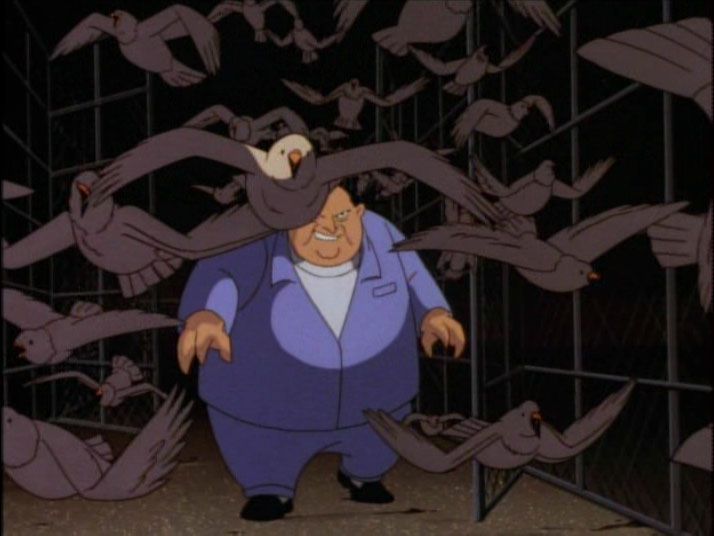
It's an all-too-common trope these days to have Batman or some other hero grill the Penguin for information, usually with their fists. As such, it's nice to see the Penguin being able to hit them back, especially in the context of a prison cell, where he theoretically should be at his weakest and most helpless. In this instant, the Penguin transforms from being a whimsically campy rogue into a ruthless threat. This moment is still one of my very favorite uses of the Penguin in TAS, especially considering that he was misused so often that people now makes cheap jokes like this. I can't blame Shortpacked for going there, but even still... low blow, man.
And so, with Thorne and Penguin eliminated from the suspects lists (because they're apparently trustworthy enough that Batman and Robin would take them at their word that they didn't do it), our heroes return to the crime scene and we're treated to a bit of high-tech detective gadgetry. I've got to say, when it comes to time-honored Batman storytelling traditions, the use of gadgets is perhaps my least favorite of them all. While I like seeing Batman be a detective, the use of high-tech gizmos does nothing for me since they just feel like convenient ways to pull something out of your ass to move the plot along.
Faced with the evidence, Batman finally admits to himself who the kidnapper has been all along, and this time, he straight-up shuts down Robin's attempts to tag along. This is something which he needs to do alone, or so he thinks. If we're to continue with my earlier analogy of friends trying to support other friends while they battle with their inner demons, then I must say that I sympathize with Bruce here for not wanting Dick involved. Dick honestly does not and cannot understand what Bruce is feeling when it comes to Harvey, but even if he could, I would imagine that Bruce--on some subconscious level--would not want to drag Dick down with him in the mess that is trying to be there for Harvey Dent. Or maybe Bruce is just being a control freak dickhole who doesn't want to involve Robin because his experience with Harvey has made him afraid of letting anybody else in even to the arms-length distance that Bruce maintains with all of his relationships.
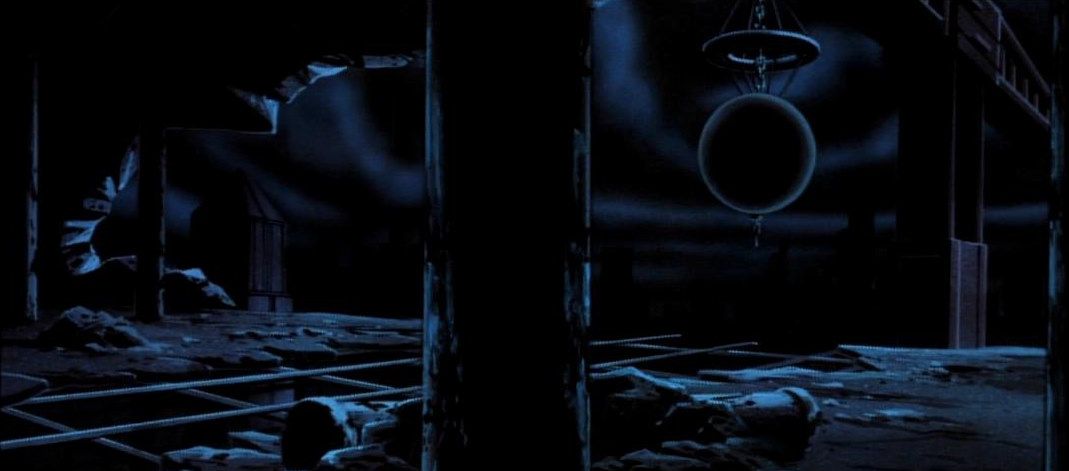
In any case, Batman heads to the half-demolished ruins of the Half Moon Club, knowing that he'll find Harvey's kidnapper here. Considering that Batman (not to mention the audience) wouldn't have even have thought of the Half Moon Club as a factor if Harvey hadn't mentioned it earlier on, I have to wonder if that was the good side consciously or subconsciously trying to tip off Batman or anyone else who might be able to come to his rescue?
BATMAN: You might as well come out. I know everything now. You hated Harvey Dent and would do anything to destroy him.
TWO-FACE: Why not? He was going to destroy me.

And thus the villain is revealed! But wait, how could this be? From what we'd seen in previous episodes, Harvey no longer had "good" or "bad" sides anymore, since Two-Face was suggested to be an integration of both Good!Harvey and "Big Bad Harv." So how could one side of Harvey be shown to act independently from the other?
Ohhhhh right, Dr. Crest's therapy was working to get Harvey to suppress his "bad side," and considering that they were already turned into one personality... well, great, now Harvey's worse off than ever! Swell! Great work, doc! Heck, even back when the "Big Bad Harv" personality would act independently of Harvey, it only happened for limited periods usually brought on by stress, but now he's managed to hold dominance over Harvey for a sustained period of time! Not only is the division within Harvey Dent deeper than ever, but from what we're seeing here, "Big Bad Harv" is now the dominant personality!
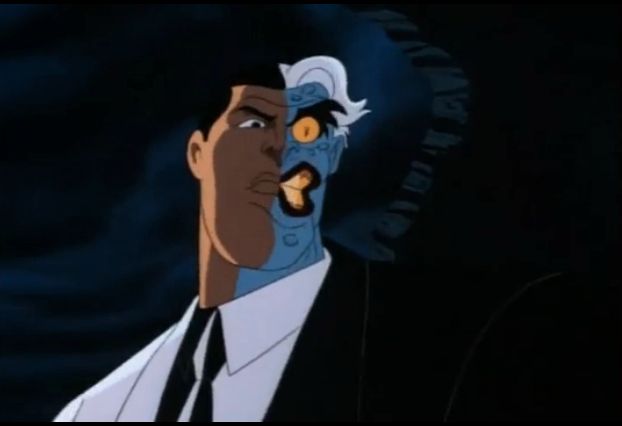
At least, that's what I gather from this episode. I doubt that any of the writers really give too much thought to Harvey's mental illness beyond "eh, he's got a good side and a bad side. Done!" so we've just kinda got to make do with what we have. I imagine that BBH/Two-Face was dying low in the time preceding the surgery, enough so that it looked like Harvey was recovering nicely, but he clearly had to be present enough to contact his henchmen from Arkham and arrange the simultaneous breakout and kidnapping of himself. In fact, thanks to Dr. Crest's treatments, I have to imagine that BBH was inadvertantly was free reign, and with that power, he decided to put Harvey in his place.
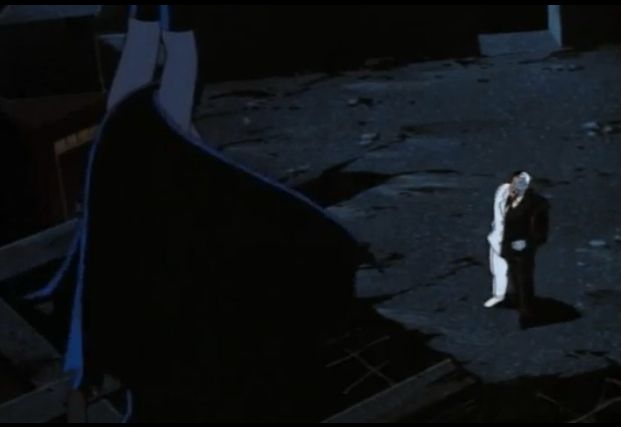
"I couldn't let that wimp Dent destroy me," Two-Face says, after subduing Batman and strapping him to a bomb (like you do). "I had to teach the little man some... respect. Everybody needs... respect." Richard Moll delivers this line much like a mobster would, masking his thuggish cruelty behind a veneer of businessman-like respectability. But looking at that line on its own, I now have to wonder if the dark side of Harvey feels genuine resentment towards the "wimp" for not respecting/accepting/embracing this very real other side of himself. BBH is, after all, the psychological equivalent of an angry (possibly abused) child, so I have to wonder if there might be more behind those words than just a mobster/supervillain wanting to take control.
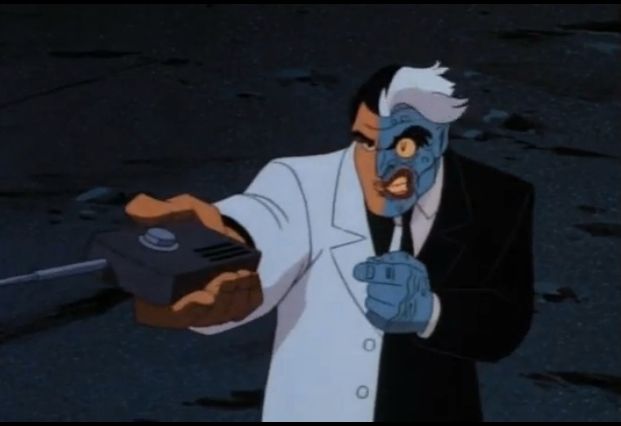
While stealthily working to cut his ropes, Batman responds with what might just be the definitive Two-Face line: "You're your own worst enemy, Harvey." Even though Two-Face responds with a comeback that's rather in keeping with the idea of BBH being little more than an overgrown child--"No, I'm YOUR worst enemy!" and no, Two-Face, sorry to say, but you're really not--I have to wonder why Two-Face would hate Batman. As I've discussed in the past, Two-Face has little actual reason to hate Batman on an arch-enemies level, a role which Rupert Thorne should be filling by all reason.
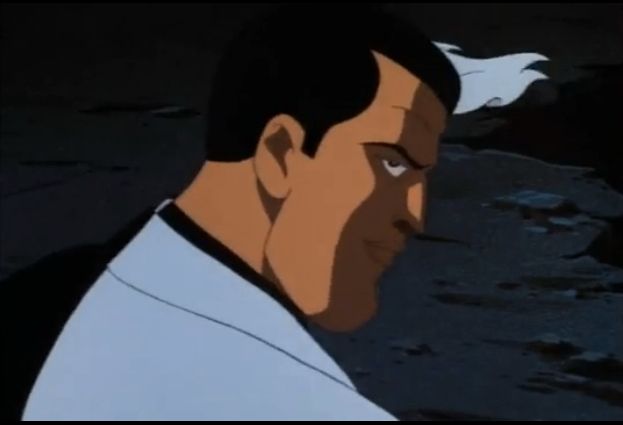
Then again, maybe there's a very good reason why he would hate Batman, and it ties into my own pet theory that Harvey--on one level or another--knows that Bruce and Batman are one and the same. In that case, it's obvious that Two-Face would utterly loathe the one true friend that Harvey Dent has left, the one person who refuses to give up on him. While my theory may be a spurious one, I think it's fair to say that it's the one that holds the most water in any case.
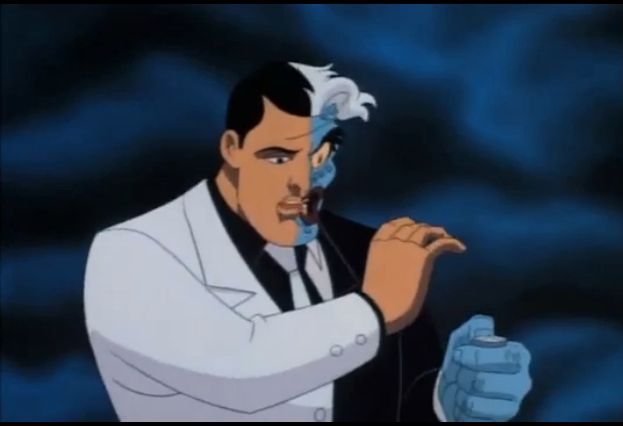
Even still, Two-Face is apparently fair-minded enough to flip the coin on whether or not to blow Batman up. Rather than take any chances on Harvey trying to pull a "you're screwed either way" rigged deal like with the giant penny, Batman demands that Harvey let the coin fall so he can see the result. Though puzzled, Two-Face acquiesces, and everyone watches as the coin hits the ground and stops... on edge.
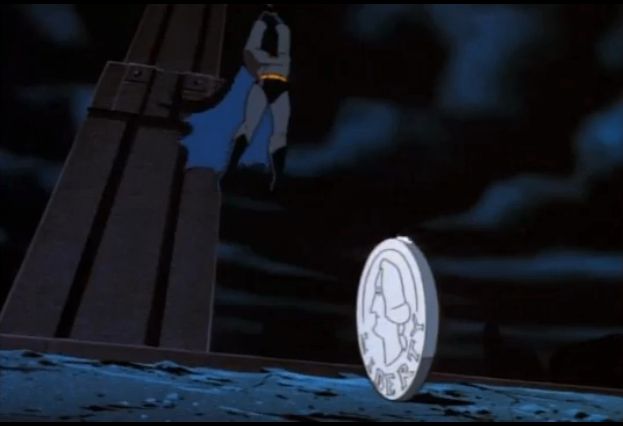
"... That can't happen."
It's a nice callback to the cliffhanger ending of the very first Two-Face appearance, but whereas Harvey Kent firmly decided to not do anything unless the coin ended up landing either way, the Two-Face of this episode can't just leave it like that, with no clear answer. No, as with the ending of Two-Face: Part II, this Two-Face needs an answer, and the lack of one will cause him to melt down entirely. Really, no other villain has meltdowns quite like poor Harvey, and this episode is a prime example of that trope.
TWO-FACE: No. It isn't possible. It can't land on edge! It has to be heads or tails! How can I decide if it isn't heads or tails?
But once again, I have to ask: WHY does this Two-Face need the coin? Why can't he decide for himself? How can a coin landing on edge over and over again cause him to meltdown? The significance of the coin in B:YAS has still not, as of yet, been given any explanation. Combined with the ambiguous depiction of Harvey's mental illness, especially in this episode and ESPECIALLY in this moment, Harvey's whole character here is seriously muddled, which is probably another reason why Two-Face never caught on in popularity with many fans.
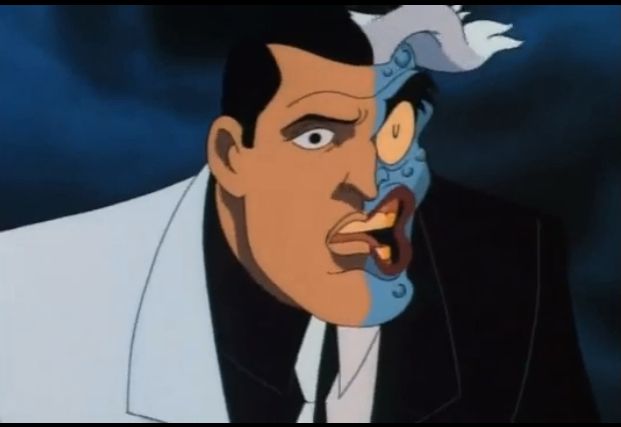
"What? That's impossible! It can't land of edge! Heads or tails, it has to be heads or tails! Heads or tails, I have to know! Heads or tails?!"
With Two-Face flipping the coin over and over in the vain hope that it won't land on edge, Batman makes his escape and battles the thugs in a scene which outright recycles some of the same fighting animation from Two-Face: Part II (if you're really interested to compare, I specifically mean Batman's little smirk when he knocks over the thugs). Robin even swings in at a crucial moment to save Batman, who shows appreciation rather than anger towards his partner's disobedience. Because friendship!
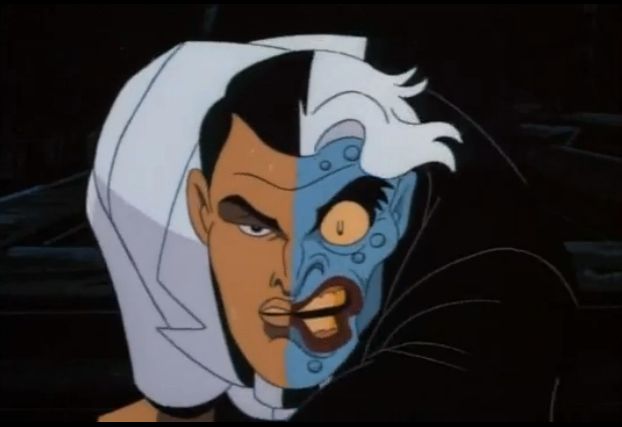
Meanwhile, their boss desperately looks for an answer from his coin, and when the coin rolls over a girder that looms precariously over a very big drop, a nervous Two-Face goes after it, sweating the whole time. He's willing to risk complete self-destruction in order to get that coin (and the answers that only it can give) because that's pretty much the only thing he has to live for. Suddenly, my metaphor comparing Harvey to an addict doesn't seem too far off!
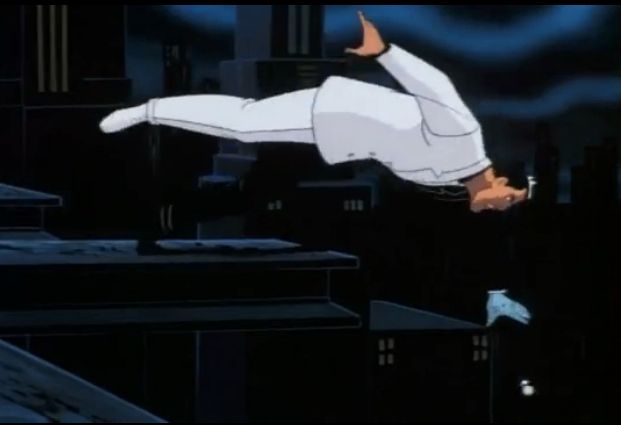
As if that metaphor weren't enough, Batman furthers it by following Harvey right onto that girder himself, catching him just as he falls. In an instant, Bruce is holding his friend, trying to save him from falling to his death, while his friend is desperately clutching the one thing he thinks that gives his life meaning. Seriously, there is so much going on in just this one scene that it's crazy how no other critics seem to have touched upon this!
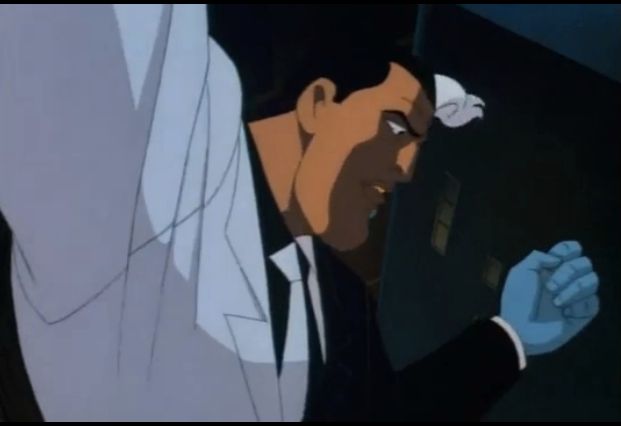
BATMAN: Harvey! Pull yourself up!
TWO-FACE: I can't...! I'll drop the coin...!
BATMAN: Drop it!
TWO-FACE: I... I don't know what to do! The coin won't tell me!
BATMAN: It can't tell you anything! I switched coins when you grabbed me! It's a trick coin! It'll ALWAYS land on edge! It's your decision now, Harvey: life or death! The coin... or me!


Okay, putting aside the fact that Two-Face could have easily put the damn coin into his pocket and then had his hand free, this is still a very powerful moment, as it forces Harvey to decide for himself at this crucial moment. More than anything else, this is the true test of how far gone Harvey might be, and as such, it's poignant and moving when he closes his eyes sadly and lets the coin slip out of his palm, letting it tumble to the streets below where it hopefully won't impale anyone.
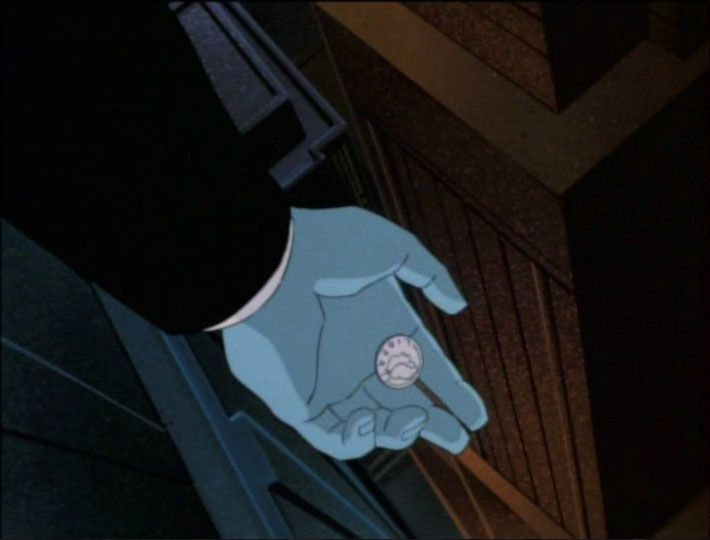
Moll's delivery of the line "Batman, help me..." is so feeble that it hardly sounds recognizable as any part of Harvey, much less Moll himself. Unlike the early scene in the OR where Harvey reminisced about Bruce and the Half-Moon Club in a voice that was softer but still raspy, there isn't a trace of rasp to his voice this time. I don't know if that was something in the script or just how Moll chose to perform that moment, but it all really does make a powerful case that there's still something within Harvey Dent that should be saved, regardless of whether or not that's even possible.
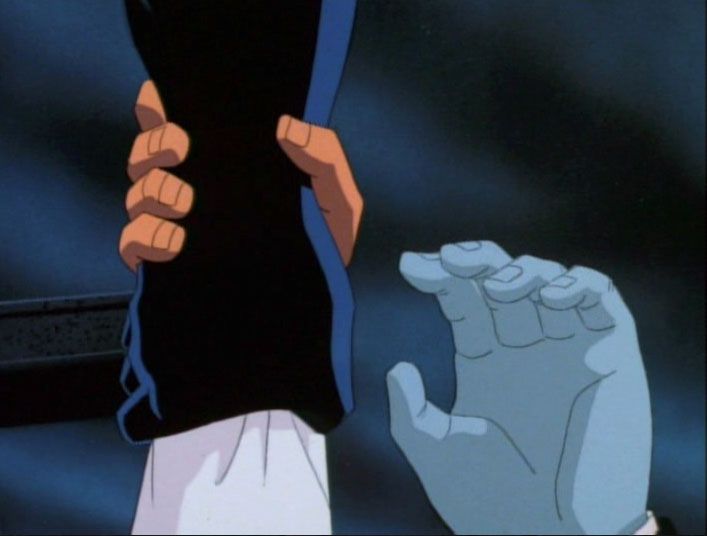
But the brutal truth of Harvey Dent is that there's always a flip side, and if this moment showed the best of Harvey acting of his own accord, the result is an equal and opposite reaction from the worst within him. Just as he reaches up with his other hand (on the "bad" side, naturally), the symbolic lightning strikes as Two-Face/BBH reemerges with a snarl of "NEVER!"

The blue scarred hand turns into a fist and he strikes the man who's trying to save his life, causing Batman to let him go. Two-Face is so filled with rage and self-destruction that one part of him would sooner destroy his whole self rather than let anyone help him. I'm not sure if this speaks more to BBH's spite towards Batman, his hatred of Harvey in general, or his fear of being obliterated in favor of Harvey being in control. In any case, Harvey sabotages his own redemptive moment, and he's sent careening onto the streets below to follow his coin, even though the coin itself seems to be the last thing on Two-Face's terrified mind.

Batman dives after Harvey, and Robin jumps in afterward to follow them both as all three free-fall for a few dozen stories. Even though Batman deploys his grappling hook, we don't see how any of them reach safety before this scene cuts out. Even with the advantage of his grapple gun gadget thingie, there's no guarentee that Batman alone could have survived his attempt to save Harvey. It could just as easily have resulting in Harvey bringing Batman down with him, which is where the importance of Robin himself comes in. Robin (and by extension, the Bat-Family in general) keeps Batman from falling down into the abyss along with his enemies. And considering that Harvey is the only enemy who is also a friend, that makes the role of Robin all the more important.
I should also mention that, just before the scene cuts off, the bomb goes off and the ruins of the Half-Moon Club are destroyed in their wake. In this instant, the last remnants of a place with symbolized Bruce and Harvey's better times is gone forever, reduced to ash by Two-Face. Taken on its own, this would be a tragic final note if it weren't immediately followed by the aftermath of Harvey--bound in a straitjacket--being escorted back to Arkham, where he's visited once more by his best and only friend, the one thing left that Two-Face cannot take from Harvey.
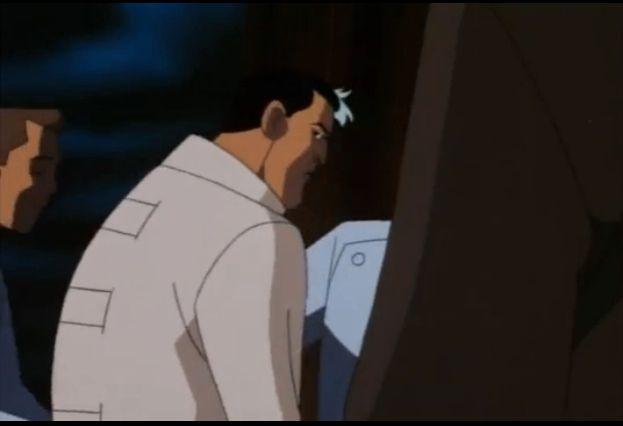
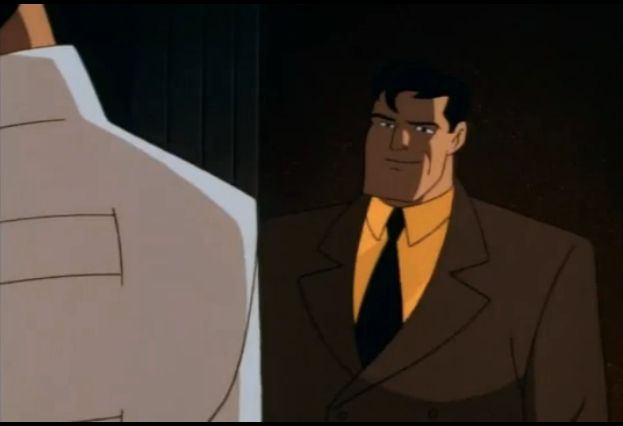


HARVEY: Bruce? Good ol' Bruce. Always there. You never give up on me.
The bittersweet warmth of Bruce in this moment--coupled with the tired happiness of Harvey--is one reason why I tend to prefer this original design of Bruce Wayne over the hardened, streamlined one from Season 4/The New Batman Adventures onward. This a rare example of Bruce Wayne--in his Bruce Wayne persona, not as an unmasked Batman--looking at someone with genuine compassion and without judgment, showing us a Bruce who isn't playing up some act. In some ways, this might be only of the only times that we've ever seen him be honest with his tortured friend. When Bruce turns from Harvey and walks away with Dick Grayson, it doesn't even seem like the two Bruces are in any way different.

DICK: He's right. You're always there for him.
BRUCE: Yes. Just like you're always there for me.
DICK: Hey, what are friends for?
Those closing lines seal the vital essence of what makes the dynamics play off each other so beautifully between Bruce, Harvey, Dick, Batman, Two-Face, and Robin. It's a delicate balance of personalities and conflict, of personalities and masks, not to mention about a Bat-Boatload of issues, and I ain't talking about comics here! Unfortunately, this balance is one that is invariably upset on a fairly regular basis, and while it often results in mediocrity and failure, sometimes it's done in the cause of a great (but heartbreaking) story.
Next time, we'll examine the saddest example of that, in what might just be the most depressing Two-Face story of all time. In that story, everything I've described above--especially the core poignancy of this friendship, not to mention Harvey's love for Grace/Gilda--is at risk of being ruined forever. So let's take one last moment to appreciate this satisfying episode before Paul Dini and Ty Templeton tear it all down for us in the next review.

The third season episode Second Chance (which you can watch here) is, for all intents and purposes, the first true sequel to Harvey's origin two-parter. While Two-Face became a recurring villain throughout the series, this episode was the first since Harvey's fall, rebirth, and meltdown to specifically focus on the fractured psyche of Harvey Dent, expanding upon the few details that we already knew. Here, we finally get a good glimpse at what's going on inside the mind of Two-Face, and the findings may be worse than we'd feared.

But these elements are all secondary (hurr) to what the episode is really about, which is an exploration of friendship under pressure as examined not just between Bruce and Harvey, but also Batman and Robin. As I've noted in the past, writers have sort of unofficially given Harvey a strange status amongst the Robins, none of whom have ever quite seen eye to eye with Batman when it comes to his unyielding faith in Harvey Dent. Second Chance puts a different spin on that dynamic by setting it in a universe where Harvey was Bruce's best (only?) friend from way before Robin came along, thus creating the friendship equivalent of love-triangle between the three (or four?) protagonists.

All of this is told through a classic-style detective mystery plotted by the Pretty Poison team of Michael Reaves and Paul Dini, whose story contains loose elements of Doug Moench and Klaus Janson's Knightfall-era story Double Cross, both parts of which I've reviewed here and here. The actual teleplay is written by Gerry Conway, the comics stalwart who brought back Rupert Thorne and Hugo Strange and co-created Killer Croc and Jason Todd, a veteran who also has experience with writing Two-Face!


I have mixed feelings about Conway's story because--fun as it was--it disregarded Harvey's previous appearance where he seemed to be on the verge of redemption and reconciliation with Gilda. That was a great, moving story with a potentially happy ending, but a couple years later, Conway brought Harvey back with no mention of Gilda, and he even threw in a blond love henchgirl love interest to boot! Was Harvey's return (and subsequent disregard of the character's own events) Conway's own idea, or was it mandated by editorial who just wanted to have everyone's favorite scarred number-themed villain back with an unchanged status quo? Heck if I know!
What matters is that Conway has experience not just with writing Batman and Robin, but also with making life suck even worse for poor Harvey Dent. A noble tradition, that! Combined with a plotting team whose previous take on Harvey had him as an oblivious romantic fool who spent most of the episode in a coma, these three writers unite to tell the second best Two-Face episode of B:TAS, and one of the key stories when it comes to the conflicts that Harvey represents. Both of them.

Gif by tokomon. Sadly, this is the only gif from the episode that I've been able to find.
Second Chance opens with a title card that seems blander than normal, but I suppose that there's something to be said about how those words cast long, dark shadows. In fact, the title disappears entirely once the writing credits are listed, but those shadows still remain. Perhaps that was intentional. Even still, I find it odd that the music which plays over this ominous card is rather dream-like and melancholy, without even the barest hint of Harvey's trademark leitmotif.

The title card fades into a scene of dark clouds in the verge of a thunderstorm, a theme that ran throughout Harvey's origin episode to signify two key moments when his dark side broke through. One again, this monster-movie-standard is used to punctuate the reveal of Two-Face, who shows up here in chains as he's escorted to a little late-night plastic surgery session as Batman and Robin watch and wait on the rooftop.

This gives way to a brief retelling of Harvey's scarring which, at first glance, seems to be just reused footage from the end of Two-Face: Part I, when in fact they reanimated and revoiced the whole thing beat for beat, just from a few different angles! While I appreciate the fact that they didn't go the route of cheap recycling, I feel like this was a missed opportunity to add in a detail or two that could have fleshed out some pertinent and still-lacking bits of backstory. As it is, we'll have to settle for the few brief glimpses of insight we're about to get in this upcoming scene, as we return to the surgery in present day.

Present in the operating room is none other than Harvey's therapist, Dr. Nora Crest, here making her first and only other appearance in B:TAS since Two-Face: Part I. She's not exactly recognizable as the same character thanks to the mask and scrubs, but she's definitely credited as Dr. Crest, and she's also voiced by the same actress, Linda Gary (who, it seems, passed away less than a month after Second Chance had aired! RIP). While it's nice to see that she hasn't given up on Harvey, what's a therapist even doing in the OR? Well, I guess she's just there to oversee the procedure as moral support for her patient, not to mention deliver handy exposition for us, the audience.

DR. CREST: Your bad side is almost completely submerged. You've done very well in therapy, Harvey. You're more in control now, able to make decisions for yourself without relying on chance. Now it's time for the final step: erasing the scars that created Two-Face. I believe that once you are whole again, your mind will be strong enough to banish Two-Face permanently.
So yeah, the premise sounds rather similar to what Dr. Wolper and Dr. Willing tried to do with Harvey in Frank Miller's The Dark Knight Returns, and we all know how well THAT worked out. While it's definitely huge news that Harvey is now able to decide without his coin, that could just result in him becoming entirely consumed by his darker side. Worse, Crest seems to be pushing for suppression, and while I don't know about how Harvey's mental illness would or should be treated in real life, that sounds like an incredibly bad idea in a literary context. What Harvey seems to desperately require in reintegration.

Because really, would Harvey ever be truly strong enough to "banish Two-Face permanently?" As far as we know, Big Bad Harv was always there under the surface, brought out by stress. Even if Harvey is "strong enough," it will be a lifelong battle to keep that side submerged and in check, much like an alcoholic has to constantly keep vigilance over something which will never, ever go away. But for the sake of this story, let's accept Dr. Crest's theory for the time being. Under the circumstances, and especially depending on how this treatment forces the villain into action, we have no reason to believe that this plastic surgery wouldn't have been just the thing to give Harvey the edge he would have needed to overcome his dark side.
In fact, this episode shows the only other glimpse we ever get into the best part of Harvey Dent that still exists within Two-Face. Just before he succumbs to the anesthesia, Harvey has a moment to speak his mind, although while his voice is softer than the usual Two-Face snarl, it's still harsher than his normal voice before the scarring. It just seems like further evidence that his vocal cords were permanently damaged... if not in the explosion, then in the primal scream of his that followed.

His first spoken line is to ask Dr. Crest, "Bruce Wayne put up the tab for this?" and he asks it with such incredulity, as if no one would go to such lengths for him, much less his own best friend.
HARVEY: Good old Bruce. He's never given up on me. Always been my best friend. I remember when we used to close the town at the Half Moon Club. Most fun we ever had. Heard they were tearing the old place down. I guess... nothing good lasts forever...

Apparently, while Harvey's "evil" eye still has lids (unlike most Two-Faces), he can't close them all the way. Maybe that's symbolism about how the bad side never sleeps? Or maybe I'm just wanky and reaching? YOU DECIDE.
Putting aside the foreshadowing plot-point-ness of that "Half-Moon Club" line, it's here that we get our a rare glimpse into the friendship that was between Bruce and Harvey. It gives me visuals of them being a kind of two-man rat pack of the Gotham City society pages, and Harvey's recollections are made all the more poignant when one considers that Bruce's carefree playboy persona is generally just a front. I have to wonder how much of Harvey's nostalgia for the "good old days" was genuine on Bruce's part? For anyone else, the answer would be "none of it, everything Bruce does is a carefully-cultivated façade, a-DUH" but I'm not so sure in this case. If Bruce's upcoming actions in this episode are any indication, Harvey may have been the only person that Bruce was even semi-comfortable being Bruce Wayne around.

Naturally, the procedure is interrupted at the last second by a gang of hoods who shoot up the joint, succeed in beating Batman and Robin, and end up kidnapping the unconscious Harvey Dent. "Don't hurt him," the lead goon commands, "Boss wants to handle Dent personally. Said he wants to teach him some respect."
This is also, to the best of my knowledge, the first confirmation that TAS Harvey's scarring covers the entire half of his body, even though it was just his face the last time we saw a post-explosion Harvey Dent in a hospital gown. As I've said in the past, I've always been annoyed by full-body scarring on Two-Face because it's just such overkill, but at least it makes sense considering the uniquely explosive origins of TAS Two-Face. Therefore, seeing as how I am clearly the final authority in all such matters, I shall ~graciously~ allow it in this one instance!

After a quick shot to establish that Dr. Crest and all of the surgeons are A-OK, we're treated to an extended car chase sequence as Batman and Robin chase down the getaway car, only to discover that Harvey's not inside! There was a second car! Really, this should have tipped them off right away, but eh, gotta go through the motions. Besides, this could all be chalked up to the possibility that Batman has a blind spot when it comes to Harvey Dent, one kept in place by a combination of hope and denial that's very rare for Bruce. As a result, this episode seems to want to have Bruce take his frustrations out on the person closest to him--his ward and sidekick--but the resulting dialogue just kind of makes Dick Grayson look like a petulant child.

ROBIN: Sorry I wasn't able to stop them.
BATMAN: I'm sure you did your best.
ROBIN: Don't gush all over me, it's embarrassing.
BATMAN: Sorry. Harvey's my friend, and I'm worried about him.
ROBIN: Right, and I'm just a kid in tights.

I think I may have hurt myself from rolling my eyes so hard. Oh my god, shut up, Dick. I know that this episode wants to show that just because Bruce lost one friend, he needs to remember that he still has one in Dick, someone who will be there for him just as loyally as Bruce will be for Harvey. But considering that Bruce does nothing to treat Dick like less than a friend, Dick's complaint comes across as butthurt, self-absorbed jealousy. Yeah, don't, like, have any sympathy for the pain Bruce is going through or anything, Dick. And really, "I'm sure you did your best" isn't good enough? Dude, Batman just apologized! BATMAN! Geez, what more does Dick want?!
Still, I do feel a small amount of sympathy for what Dick must be going through here, especially when you take into account the awkward role that all Robins are in when it comes to being the third wheel between Batman and Two-Face's ongoing drama, with Bruce desperately trying to save the soul of this man who is constantly trying to kill him, not to mention his sidekick too. The idea of someone trying to save someone from themselves is something which exists in the real, non-superheroic world that you and I presumably inhabit.
You can find these parallels in the form of someone struggling with addiction, mental illness, or even just something deeply flawed in a person's nature, and often times the only way they can hope to overcome these demons is to have the love and support of friends the hopeful highs and crushing lows. Unfortunately, the harder the struggle, the more it can weigh down on those friends until it threatens to drag them down too, to the point that it can strain that friend's other relationships as well! To a third party involved, this can be deeply frustrating. The temptation is to say, "Let them fall! They're not worth it!" which often comes with an undertone of "Why do you even need that person? You have me, a friend who won't drag you down, who won't hurt you, and I'm here for you now!"
That's the position I see the Robins in, as they have to watch their father figure tear himself up with constant misery and disappointment over a person who--in their eyes--just plain isn't worth it. It doesn't help that Two-Face has also tried to kill Dick himself on more than one occasion, and if you take Robin: Year One-era Dick into account, then yeah, he has plenty of reason to hate Harvey himself. But B:TAS!Dick here doesn't have that excuse, yet he still exhibits a similar frustrations towards Bruce coupled with a lack of empathy (thanks to a lack of personal connection) for Harvey. So yeah, I do sympathize with Dick a bit here... even if I still think he's being a petulant, butthurt child.

Way to go, Dick. Batman is now sad.
So, Batman and Robin split up to investigate two likely suspects, both of whom have good reason to want to ruin Harvey's life, although only one of them has that established by canon: Rupert Thorne. If I'm not mistaken, the last time we saw Thorne was when he was trussed up like a Christmas turkey in the first five minutes of Shadow of the Bat: Part I. Thorne was finally brought to justice in that episode, and while it wasn't apparent at the time, Harvey was instrumental in the arrest so as to both exact revenge as well as usurp Thorne's place as underworld kingpin. And yet, in this episode, Thorne's back as if nothing had ever changed.

I just assumed that this was because much of B:TAS followed the status-quo-reset-button nature of superhero comics where the villains who were arrested in one episode would suddenly be back on the streets in the next one with no explanation whatsoever, so continuity in this show only matters if the writers want it to matter. Still, I can't help but see this as rubbing salt in the wound for Harvey, that for all his work as both D.A. and mob boss, his worst enemy is still sitting pretty, continuing to get away with everything.

Well, I guess this can be accepted given the fact that Harvey already had some measure of revenge once, not to mention the fact that this episode explicitly points out who Two-Face really hates more than anyone else, and Thorne doesn't even warrant a mention. I guess Harvey's beyond that now... for some reason. Besides, if you really wanted to find a reason why Thorne might be free, Harvey himself might be to blame for that, seeing as how he chose to bring Thorne down using Gil Mason in a web of lies and corruption. I'm sure Harvey's meddling created enough technicalities to get Thorne off. That failure could be all the more reason why the villain of this episode hates Harvey Dent so intensely, simply because his bungling allowed a Grade-A menace like Rupert Thorne go free.
Hey, if this show's not going to give me canon, then goddammit, I'm just gonna take what there is and come up with something myself!

After Thorne denies his involvement in the kidnapping to Robin, he decides, "Well, this evening shouldn't be a total wash. I'll have the sidekick killed!" and orders his men (including Frankie, the thug who kicked mud on Harvey way back in Two-Face: Part I) to throw Dick off a bridge. This gives way to a nice little moment where Frankie gets to wax philosophical like a Tarantino crook, which helps give a teeny bit of personality to the otherwise bland henchman. His monologue also serves as a nice set-up for Dick to deliver the punchline... with his feet. It's a nicely-executed scene, and for once, Robin's snarky quip didn't make me want to knee-jerk utter "Shut up, Dick." That's something!

Batman, meanwhile, followed his own lead all the way to Blackgate Stonegate Penitentiary--the prison that was "Dent's Dream," if you'll recall, not that it has any bearing on this episode one way or another-- to confront Oswald Cobblepot himself, who has been appropriately fashioned after Birdman of Alcatraz. Very appropriate, that. Unlike Thorne, the Penguin's conflict with Two-Face is not based in canon, but is rather explained away as grudge after Harvey stole a precious statuette that had the misfortune of being two-headed as well as bird-shaped. Damn it, won't museums in Gotham ever learn?!

While this insult may have been enough to explain why Penguin never palled around with Harvey and the Joker anymore (sadly), Ozzie seems to be a class act as always, denying any involvement in Harvey's kidnapping. "I'd never kidnap a fellow rogue out of a sickbed. It just isn't done." While the comics have loved to depict the Penguin as a back-stabbing, sleazy, ruthless, and unscrupulous bastard, I think that there's something genuinely endearing about how TAS Penguin truly believes in "honor among thieves," especially since that doesn't cancel out the fact that he's nonetheless a dangerous, devious foe who might, oh, I dunno, send a whole flight of pigeons at a man to knock him off a ledge and send him hurdling to the jagged rocks below.

It's an all-too-common trope these days to have Batman or some other hero grill the Penguin for information, usually with their fists. As such, it's nice to see the Penguin being able to hit them back, especially in the context of a prison cell, where he theoretically should be at his weakest and most helpless. In this instant, the Penguin transforms from being a whimsically campy rogue into a ruthless threat. This moment is still one of my very favorite uses of the Penguin in TAS, especially considering that he was misused so often that people now makes cheap jokes like this. I can't blame Shortpacked for going there, but even still... low blow, man.
And so, with Thorne and Penguin eliminated from the suspects lists (because they're apparently trustworthy enough that Batman and Robin would take them at their word that they didn't do it), our heroes return to the crime scene and we're treated to a bit of high-tech detective gadgetry. I've got to say, when it comes to time-honored Batman storytelling traditions, the use of gadgets is perhaps my least favorite of them all. While I like seeing Batman be a detective, the use of high-tech gizmos does nothing for me since they just feel like convenient ways to pull something out of your ass to move the plot along.
Faced with the evidence, Batman finally admits to himself who the kidnapper has been all along, and this time, he straight-up shuts down Robin's attempts to tag along. This is something which he needs to do alone, or so he thinks. If we're to continue with my earlier analogy of friends trying to support other friends while they battle with their inner demons, then I must say that I sympathize with Bruce here for not wanting Dick involved. Dick honestly does not and cannot understand what Bruce is feeling when it comes to Harvey, but even if he could, I would imagine that Bruce--on some subconscious level--would not want to drag Dick down with him in the mess that is trying to be there for Harvey Dent. Or maybe Bruce is just being a control freak dickhole who doesn't want to involve Robin because his experience with Harvey has made him afraid of letting anybody else in even to the arms-length distance that Bruce maintains with all of his relationships.

In any case, Batman heads to the half-demolished ruins of the Half Moon Club, knowing that he'll find Harvey's kidnapper here. Considering that Batman (not to mention the audience) wouldn't have even have thought of the Half Moon Club as a factor if Harvey hadn't mentioned it earlier on, I have to wonder if that was the good side consciously or subconsciously trying to tip off Batman or anyone else who might be able to come to his rescue?
BATMAN: You might as well come out. I know everything now. You hated Harvey Dent and would do anything to destroy him.
TWO-FACE: Why not? He was going to destroy me.

And thus the villain is revealed! But wait, how could this be? From what we'd seen in previous episodes, Harvey no longer had "good" or "bad" sides anymore, since Two-Face was suggested to be an integration of both Good!Harvey and "Big Bad Harv." So how could one side of Harvey be shown to act independently from the other?
Ohhhhh right, Dr. Crest's therapy was working to get Harvey to suppress his "bad side," and considering that they were already turned into one personality... well, great, now Harvey's worse off than ever! Swell! Great work, doc! Heck, even back when the "Big Bad Harv" personality would act independently of Harvey, it only happened for limited periods usually brought on by stress, but now he's managed to hold dominance over Harvey for a sustained period of time! Not only is the division within Harvey Dent deeper than ever, but from what we're seeing here, "Big Bad Harv" is now the dominant personality!

At least, that's what I gather from this episode. I doubt that any of the writers really give too much thought to Harvey's mental illness beyond "eh, he's got a good side and a bad side. Done!" so we've just kinda got to make do with what we have. I imagine that BBH/Two-Face was dying low in the time preceding the surgery, enough so that it looked like Harvey was recovering nicely, but he clearly had to be present enough to contact his henchmen from Arkham and arrange the simultaneous breakout and kidnapping of himself. In fact, thanks to Dr. Crest's treatments, I have to imagine that BBH was inadvertantly was free reign, and with that power, he decided to put Harvey in his place.

"I couldn't let that wimp Dent destroy me," Two-Face says, after subduing Batman and strapping him to a bomb (like you do). "I had to teach the little man some... respect. Everybody needs... respect." Richard Moll delivers this line much like a mobster would, masking his thuggish cruelty behind a veneer of businessman-like respectability. But looking at that line on its own, I now have to wonder if the dark side of Harvey feels genuine resentment towards the "wimp" for not respecting/accepting/embracing this very real other side of himself. BBH is, after all, the psychological equivalent of an angry (possibly abused) child, so I have to wonder if there might be more behind those words than just a mobster/supervillain wanting to take control.

While stealthily working to cut his ropes, Batman responds with what might just be the definitive Two-Face line: "You're your own worst enemy, Harvey." Even though Two-Face responds with a comeback that's rather in keeping with the idea of BBH being little more than an overgrown child--"No, I'm YOUR worst enemy!" and no, Two-Face, sorry to say, but you're really not--I have to wonder why Two-Face would hate Batman. As I've discussed in the past, Two-Face has little actual reason to hate Batman on an arch-enemies level, a role which Rupert Thorne should be filling by all reason.

Then again, maybe there's a very good reason why he would hate Batman, and it ties into my own pet theory that Harvey--on one level or another--knows that Bruce and Batman are one and the same. In that case, it's obvious that Two-Face would utterly loathe the one true friend that Harvey Dent has left, the one person who refuses to give up on him. While my theory may be a spurious one, I think it's fair to say that it's the one that holds the most water in any case.

Even still, Two-Face is apparently fair-minded enough to flip the coin on whether or not to blow Batman up. Rather than take any chances on Harvey trying to pull a "you're screwed either way" rigged deal like with the giant penny, Batman demands that Harvey let the coin fall so he can see the result. Though puzzled, Two-Face acquiesces, and everyone watches as the coin hits the ground and stops... on edge.

"... That can't happen."
It's a nice callback to the cliffhanger ending of the very first Two-Face appearance, but whereas Harvey Kent firmly decided to not do anything unless the coin ended up landing either way, the Two-Face of this episode can't just leave it like that, with no clear answer. No, as with the ending of Two-Face: Part II, this Two-Face needs an answer, and the lack of one will cause him to melt down entirely. Really, no other villain has meltdowns quite like poor Harvey, and this episode is a prime example of that trope.
TWO-FACE: No. It isn't possible. It can't land on edge! It has to be heads or tails! How can I decide if it isn't heads or tails?
But once again, I have to ask: WHY does this Two-Face need the coin? Why can't he decide for himself? How can a coin landing on edge over and over again cause him to meltdown? The significance of the coin in B:YAS has still not, as of yet, been given any explanation. Combined with the ambiguous depiction of Harvey's mental illness, especially in this episode and ESPECIALLY in this moment, Harvey's whole character here is seriously muddled, which is probably another reason why Two-Face never caught on in popularity with many fans.

"What? That's impossible! It can't land of edge! Heads or tails, it has to be heads or tails! Heads or tails, I have to know! Heads or tails?!"
With Two-Face flipping the coin over and over in the vain hope that it won't land on edge, Batman makes his escape and battles the thugs in a scene which outright recycles some of the same fighting animation from Two-Face: Part II (if you're really interested to compare, I specifically mean Batman's little smirk when he knocks over the thugs). Robin even swings in at a crucial moment to save Batman, who shows appreciation rather than anger towards his partner's disobedience. Because friendship!

Meanwhile, their boss desperately looks for an answer from his coin, and when the coin rolls over a girder that looms precariously over a very big drop, a nervous Two-Face goes after it, sweating the whole time. He's willing to risk complete self-destruction in order to get that coin (and the answers that only it can give) because that's pretty much the only thing he has to live for. Suddenly, my metaphor comparing Harvey to an addict doesn't seem too far off!

As if that metaphor weren't enough, Batman furthers it by following Harvey right onto that girder himself, catching him just as he falls. In an instant, Bruce is holding his friend, trying to save him from falling to his death, while his friend is desperately clutching the one thing he thinks that gives his life meaning. Seriously, there is so much going on in just this one scene that it's crazy how no other critics seem to have touched upon this!

BATMAN: Harvey! Pull yourself up!
TWO-FACE: I can't...! I'll drop the coin...!
BATMAN: Drop it!
TWO-FACE: I... I don't know what to do! The coin won't tell me!
BATMAN: It can't tell you anything! I switched coins when you grabbed me! It's a trick coin! It'll ALWAYS land on edge! It's your decision now, Harvey: life or death! The coin... or me!


Okay, putting aside the fact that Two-Face could have easily put the damn coin into his pocket and then had his hand free, this is still a very powerful moment, as it forces Harvey to decide for himself at this crucial moment. More than anything else, this is the true test of how far gone Harvey might be, and as such, it's poignant and moving when he closes his eyes sadly and lets the coin slip out of his palm, letting it tumble to the streets below where it hopefully won't impale anyone.

Moll's delivery of the line "Batman, help me..." is so feeble that it hardly sounds recognizable as any part of Harvey, much less Moll himself. Unlike the early scene in the OR where Harvey reminisced about Bruce and the Half-Moon Club in a voice that was softer but still raspy, there isn't a trace of rasp to his voice this time. I don't know if that was something in the script or just how Moll chose to perform that moment, but it all really does make a powerful case that there's still something within Harvey Dent that should be saved, regardless of whether or not that's even possible.

But the brutal truth of Harvey Dent is that there's always a flip side, and if this moment showed the best of Harvey acting of his own accord, the result is an equal and opposite reaction from the worst within him. Just as he reaches up with his other hand (on the "bad" side, naturally), the symbolic lightning strikes as Two-Face/BBH reemerges with a snarl of "NEVER!"

The blue scarred hand turns into a fist and he strikes the man who's trying to save his life, causing Batman to let him go. Two-Face is so filled with rage and self-destruction that one part of him would sooner destroy his whole self rather than let anyone help him. I'm not sure if this speaks more to BBH's spite towards Batman, his hatred of Harvey in general, or his fear of being obliterated in favor of Harvey being in control. In any case, Harvey sabotages his own redemptive moment, and he's sent careening onto the streets below to follow his coin, even though the coin itself seems to be the last thing on Two-Face's terrified mind.

Batman dives after Harvey, and Robin jumps in afterward to follow them both as all three free-fall for a few dozen stories. Even though Batman deploys his grappling hook, we don't see how any of them reach safety before this scene cuts out. Even with the advantage of his grapple gun gadget thingie, there's no guarentee that Batman alone could have survived his attempt to save Harvey. It could just as easily have resulting in Harvey bringing Batman down with him, which is where the importance of Robin himself comes in. Robin (and by extension, the Bat-Family in general) keeps Batman from falling down into the abyss along with his enemies. And considering that Harvey is the only enemy who is also a friend, that makes the role of Robin all the more important.
I should also mention that, just before the scene cuts off, the bomb goes off and the ruins of the Half-Moon Club are destroyed in their wake. In this instant, the last remnants of a place with symbolized Bruce and Harvey's better times is gone forever, reduced to ash by Two-Face. Taken on its own, this would be a tragic final note if it weren't immediately followed by the aftermath of Harvey--bound in a straitjacket--being escorted back to Arkham, where he's visited once more by his best and only friend, the one thing left that Two-Face cannot take from Harvey.




HARVEY: Bruce? Good ol' Bruce. Always there. You never give up on me.
The bittersweet warmth of Bruce in this moment--coupled with the tired happiness of Harvey--is one reason why I tend to prefer this original design of Bruce Wayne over the hardened, streamlined one from Season 4/The New Batman Adventures onward. This a rare example of Bruce Wayne--in his Bruce Wayne persona, not as an unmasked Batman--looking at someone with genuine compassion and without judgment, showing us a Bruce who isn't playing up some act. In some ways, this might be only of the only times that we've ever seen him be honest with his tortured friend. When Bruce turns from Harvey and walks away with Dick Grayson, it doesn't even seem like the two Bruces are in any way different.

DICK: He's right. You're always there for him.
BRUCE: Yes. Just like you're always there for me.
DICK: Hey, what are friends for?
Those closing lines seal the vital essence of what makes the dynamics play off each other so beautifully between Bruce, Harvey, Dick, Batman, Two-Face, and Robin. It's a delicate balance of personalities and conflict, of personalities and masks, not to mention about a Bat-Boatload of issues, and I ain't talking about comics here! Unfortunately, this balance is one that is invariably upset on a fairly regular basis, and while it often results in mediocrity and failure, sometimes it's done in the cause of a great (but heartbreaking) story.
Next time, we'll examine the saddest example of that, in what might just be the most depressing Two-Face story of all time. In that story, everything I've described above--especially the core poignancy of this friendship, not to mention Harvey's love for Grace/Gilda--is at risk of being ruined forever. So let's take one last moment to appreciate this satisfying episode before Paul Dini and Ty Templeton tear it all down for us in the next review.